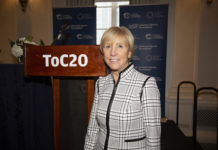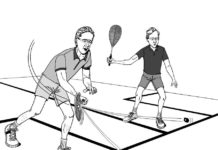A REAL ISSUE
Thank you for your article helping to clarify the Bleeding Rule. As a physician/parent of young squash competitors, I find the rule neither “draconian” nor “an over-reaction to the AIDS scare 15 years ago.” AIDS is alive and well in the USA with 40,000 new infections occurring each year, half of which are in people 25 years of age or younger. Other blood borne pathogens include Hepatitis B and C. I think the rule is important and should be taken seriously. Being exposed to another’s blood is unsafe and unsanitary.
I would also add that a referee who sees a bandage fall to the court should stop play immediately and award the point to the opponent. No one wants to slip and fall on a bloody bandage. Players who dive for balls may want to reconsider if re-bleeding means losing the game or even the match.
Holly J. Smedira, M.D.
Moreland Hills, OH
TAKING THE HIGH ROAD
 One of the most unique and extraordinary aspects of squash is the fact that 99 percent of all play, even highly competitive matches, are contested without refereeing. Players are compelled to make calls that only favor their opponents, always at their own expense. Most often, both players know whether the call was right or wrong.
One of the most unique and extraordinary aspects of squash is the fact that 99 percent of all play, even highly competitive matches, are contested without refereeing. Players are compelled to make calls that only favor their opponents, always at their own expense. Most often, both players know whether the call was right or wrong.
Imagine requiring the first baseman to call all close plays at the bag, or running backs to self-confess fumbles?
Not only do all of us do just that routinely in our matches, but we do it largely without fanfare, a mutually understood knowledge of the rules binding us together, even as we are contestants battling against each other.
I believe that the formal rules of squash should be altered to reflect that wonderfully appealing virtue in every level of play. Players in matches contested with the benefit of officiating should be required, by rule change, to first make their requests for lets and strokes to their opponent. If the opponent denies the request, only then, at the option of that player, can he or she appeal to the officials.
It seems to me contrary to the spirit of the game to obfuscate or otherwise suspend our obligation to our fellow player by exempting ourselves from the decision making process simply because officials are on-site. Outside forces should always be the last resort for a decision, not a substitution for our own tests of character.
This change would add a wonderful component to competitive play by insisting that the players demonstrate not only their understanding of the game, but their propensity to either tarnish or polish it, and their own image, by benefit of their demeanor.
Bob Kingsley
Teaching Professional
Binghamton, New York
EQUAL COVERAGE
As part of their M.Sc. (Master of Science) in Coaching program studies, our graduate students at Smith College do a “Media Representation of Gender” analysis of print media. I would like to commend you for your coverage of female squash athletes in the February 2007 issue of Squash Magazine. Although the overall number of photographs of males (27) was higher than females—when we exclude the instructional section, and focus only on the photographs featured in stories—the number was the same for both sexes (18). As you are aware, this ratio is almost unheard of in our popular sports media. Your equitable coverage contributes greatly to the development of our sport.
Tim Bacon, M.A.
Lecturer, Exercise and Sport Studies/
Head Squash Coach, Smith College
Northampton, Massachusetts
FOREIGN TAKEOVER?
The Question Raised
Do you believe that the current status of the Trinity College squash program is beneficial to both junior squash in the US as well as American squash overall?
Response:
I believe that getting better players to play in the US, no matter at what level, in what concentration or wherever from, is good for American squash—both for spectators and for aspiring local competitors (a.k.a. juniors). I’ve been coaching for 10 years, and I still feel that watching the best players and trying to emulate their technique, shot selection and movement patterns consciously or not is one of, if not the single, best way to improve at squash.
Unless you attend Harvard, Yale or Princeton or are a booster, you couldn’t care less whether the Trinity No. 9 beats the Harvard No. 9, or who wins the overall match. As I’ve said, squash is primarily an individual sport. Team competitions are mostly artificial. The World Teams has never had the cachet of the British Open or World Open.
Legislating a limit of foreign players on a team is just plain dumb and against the American ideal of so-called free market competition. (Though I know plenty of good arguments for protectionist policies for local industries). Playing ostrich and ignoring superior foreign squash is equally silly. The notion that an American teenager will lose interest in squash because he or she sees foreign domination at Trinity, I still find laughable.
Heard on the US Squash Forum





